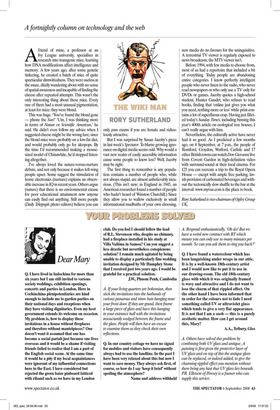A friend of mine, a professor at an Ivy League university,
specialises in research into transgenic mice, learning how DNA modifications affect intelligence and memory. A few years ago, after some genetic tinkering, he created a batch of mice of quite spectacular dimwittedness. They were useless in the maze, ditzily wandering about with no sense of spatial awareness and incapable of finding the cheese after repeated attempts. This wasn’t the only interesting thing about these mice. Every one of them had a most unusual pigmentation, at least for mice: they were blond.
This was huge. ‘You’ve found the blond gene — phone the Sun!’ ‘Um, I was thinking more in terms of Nature or Scientific American,’ he said. He didn’t even follow my advice when I suggested cheese might be the wrong lure, since the blond mice were probably on a low-fat diet, and would probably only go for alcopops. By the time I’d recommended making a mousesized model of Chinawhite, he’d stopped listening altogether.
I’ve always loved the nature-versus-nurture debate, and not only because it makes left-wing people upset. Some suggest the stimulation of home electronics (nurture) explains an observable increase in IQ in recent years. Others argue (nature) that there is no environmental excuse for poor educational attainment now anyone can easily find out anything. Still more people (Daily Telegraph photo editors) believe you can only pass exams if you are female and ridiculously attractive.
But I was surprised by Susan Jacoby’s piece in last week’s Spectator. To blame growing ignorance on digital media seems odd. Why would a vast new realm of easily accessible information cause some people to know less? Well, Jacoby may be right.
The first thing to remember is any population contains a number of people who, while not always stupid, are almost unbelievably incurious. (This isn’t new; in England in 1945, an American researcher found a number of people who hadn’t heard of Winston Churchill.) Since they allow you to wallow exclusively in small informational mudbaths of your own choosing, new media do no favours for the uninquisitive. A terrestrial TV viewer is regularly exposed to news broadcasts; the MTV viewer isn’t.
Before 1994, with few media to choose from, most of us had a repertoire that included a bit of everything. Today people are abandoning entire categories. I know perfectly intelligent people who never listen to the radio, who never read newspapers or who only use a TV only for DVDs or games. Jacoby quotes a high-school student, Hunter Gaudet, who refuses to read books, finding that ‘online just gives you what you need, nothing more or less’ while print contains a lot of superfluous crap. Having just filleted today’s Sunday Times, including binning this year’s 400th article on ecological tree houses, I can’t really argue with him.
Nevertheless, the culturally active have never had it so good. As I predicted a few months ago, on 8 September, at 7 p.m., the people of Romford, Croydon, Watford, Carlisle and 17 other British towns can watch Don Giovanni live from Covent Garden in high-definition video with surround-sound at their local cinema. For £25 you can recreate a trip to the Royal Opera House — except with ample free parking, lavish provision of carbonated beverages and without the tectonically slow shuffle to the bar at the interval: www.myvue.com is the place to book.
Rory Sutherland is vice-chairman of Ogilvy Group UK.


































































 Previous page
Previous page